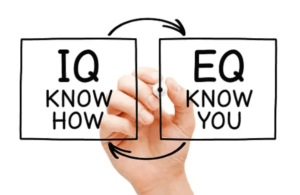Welcome Blessings!
(Tap 🔽 to see more topics!)


Have you ever asked yourself how to improve your emotional intelligence? Aristotle said, “Knowing yourself is the beginning of all wisdom.” Do you agree with this quote? Don’t you know that our emotions, thoughts, strengths, weaknesses, values, and motivations are the keys to our success and happiness? Many experts and leaders believe self-awareness is the most dominant personal and professional growth skill.
However, more than self-awareness is needed. We also need to be mindful of the emotional state of others and how to respond well. That means we need to have emotional intelligence. It is the capacity to comprehend and control our emotions and those of others and to use them to guide our actions and decisions.

Today, I will show you how to develop self-awareness and emotional intelligence and use them to lead from within. I am also not perfect like you; hence, I remind myself of these things now and then. Stay tuned because I will share some tips and strategies to become a more authentic, confident, and influential leader who can inspire others and achieve your goals based on interviews I conducted with some experts and professionals.
According to research, self-awareness is recognizing and understanding our emotions, thoughts, strengths, weaknesses, values, and motivations. At the same time, emotional intelligence is the ability to manage our feelings and those of others and to use them to guide our actions and decisions. These two skills are closely related and mutually reinforcing. They are also the foundation of successful Leadership.
Furthermore, according to research, leaders who are self-aware and emotionally intelligent are more likely to:
Some tips and strategies that we can apply in our daily lives are as follows;

Mindfulness is paying attention to the present moment with curiosity and openness. It helps us become more aware of our emotions, thoughts, sensations, and impulses. It also calms our minds, reduces stress, and improves our focus. We can practice mindfulness by meditating, breathing deeply, or doing any activity that requires our full attention. For example, we can practice mindfulness by walking in nature and noticing the sights, sounds, smells, and feelings around us. It can help us relax, clear our minds, and appreciate the beauty of life.

Reflection is a process of our experiences, actions, feelings, beliefs, and values. It helps us understand ourselves, our goals, challenges, and opportunities. It also lets us learn from our successes and failures and grow as a person and a leader. We can reflect on ourselves by journaling, asking questions, or seeking feedback from others. For instance, we can reflect on ourselves by writing down three things we are proud of and want to improve on. It can help us identify our strengths and areas for improvement.

Empathy is the power to deliver understanding to another person. It helps us build rapport, trust, and respect with others. Also, it guides us to communicate effectively, resolve conflicts, and influence others positively. We can empathize with others by listening actively, asking open-ended questions, expressing our feelings, and showing support. Specifically, we can empathize with others by putting ourselves in their shoes and imagining how they feel. It can help us understand their perspective, needs, and expectations and respond accordingly.

Emotion management is the ability to regulate our emotions and those of others. Moreover, it helps us cope with stress, frustration, anger, and fear. It also aids us in enhancing our positive emotions, such as happiness, gratitude, and enthusiasm. We can manage them by identifying, labeling, expressing them appropriately, and choosing constructive responses. We can use relaxation techniques to calm down when we are feeling overwhelmed. It can help us calm down and avoid saying or doing something we might regret later.

Social skills are the ability to interact and cooperate with others in various situations. They help us build and maintain relationships, work in teams, and lead others effectively. Moreover, they also guide us to adapt to different personalities, cultures, and contexts. We can develop our social skills by practicing active listening, giving and receiving feedback, collaborating, delegating, and motivating. Also, we can improve our social skills by giving sincere compliments and constructive criticism to others. It can help us boost their confidence and performance. On top of that, it will also help us improve our reputation and credibility.
In short, these are some ways you can develop self-awareness, improve your emotional intelligence, and lead from within. With these tips and strategies, we can become more authentic, confident, and influential leaders who can inspire others and achieve our goals. As Robin S. Sharma said, “Leadership is not about a title or a designation. It’s about impact, influence, and inspiration.” Remember, it is not something that we are born with or given. Undeniably, it is something that we develop and earn and that we lead from within.
If you have any questions or comments, feel free to leave them below. Thanks for reading, and I’ll see you at the next one.